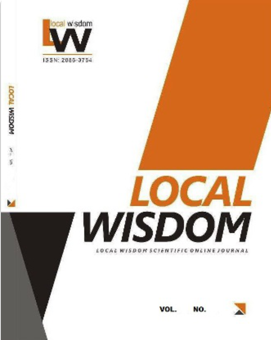Jolotundo As an Attraction of Local Wisdom Based Ecotourism
DOI:
https://doi.org/10.26905/lw.v12i2.4144Keywords:
local wisdom, Ecotourism, JolotundoAbstract
Tourism has now developed into one of the largest industries in various parts of the world by providing many benefits in each sector In addition this study also aims to determine whether there is an influence of the perception of tourists in the Jolotundo area as an ecotourism attraction in the village of Seloliman. Ethnography was used to conduct this study. Qualitative data related to local wisdom were obtained through several techniques. Interview and observation were used to gain the main data, while secondary data were taken from related document analysis. The result The most frequent activity of visitors to Jolotundo is at night. On certain nights, such as on the full moon night, Friday night legi, 1 muharram night, and on the night of one Suro. On that night Jolotundo was full of pilgrims, many thousands of pilgrims came to hold rituals with a specific purpose. Every day the Jolotundo temple is crowded by visitors. Many of them are carrying out activities in the temple. Every activity carried out by the community varies depending on their desires and beliefs. Some visitors who come to Petirtaan Jolotundo also have a need for recreation "refreshing the mind" and can also be used for study tours because the natural panorama of Petirtaan Jolotundo tourism is indeed very beautiful and cool on the western slope of Mount Penanggungan, so it also right to refresh the mind.
Â
Downloads
References
Aliman, Khasimah, Shareena Mohamed Hashim, 2014. Tourist Expectations, Perceived Quality and Destination Image: Effects on Perceived Value and Satisfaction of Tourists Visiting Langkawi Island, Malaysia. Asian Journal of Business and Management. Volume 02– Issue 03, 2014. Pp. 212-222.
Baskoro Azis, Herry Santosa, Jenny Ernawati (2019). “Assessment of Community Perceptions of Historical Buildings in Kayutangan Corridor, Malang, Indonesia†Journal Local Wisdom, 11 (1), Pp 1-15, 2019.
Bkric, Nenad and Semsudin Dzeko, 2008, Managing Tourist Satisfaction and Retention: A Case of Tourist Destination Canton Sarajevo, Bosnia and Herzegovina.
Dinas Pemuda, Olahraga, Mojokerto Culture and Tourism. 2016. Regional Tourism Unit. Mojokerto.
Drumm, A. dan Alan, M. 2002. Ecotourism Development: An Introduction to Ecotourism Planning. Buku. The Nature Conservancy. USA. 85 hlm.
Irianto. 2011. The impact of tourism on the community's social and economic life in Gili Trawangan, the winning district of North Lombok Regency. Jurnal Bisnis & Kewirausahaan. 7(3): 188-194.
Jones, S. 2005. Community based ecotourism the significance of social capital. Journal Annals of Tourism Research. 14(2): 303–324.
Karyono, A. Hari. 2007. Tourism. Jakarta: Grasindo.
Pawitra, Theresia A., dan Tan, Kay C. 2013. Tourist Satisfaction in Singapore – Perspective from Indonesian Tourist. Managing Service Quality, 13 (5), pp.399-411.
Peraturan Pemerintah. 2009. Law of the Republic of Indonesia Number 10. Concerning Tourism. Book. President of the Republic of Indonesia. Jakarta. 422 hlm.
Rahman, A. 2003. Ecotourism Exploitation. Thesis. Faculty of Forestry, Gajah Mada University. Yogyakarta. 32 hlm.
Siagian, Renvile. 2013. Temple as Indonesia's Art and Cultural Heritage. Yogyakarta: Yayasan Cempaka Kencana.
Suwarno, D. 2002. Tourism Ecology. Book. Angkasa Offset. Jakarta. 338 hlm.
Suyanto, Bagong dan Sutinah. 2013. Social Research Methods Various Alternative Approaches. Jakarta: Kencana.
TIES. 2006. Fact Sheet: Global Ecotourism. Book. The International Ecotourism Society. Washington.












